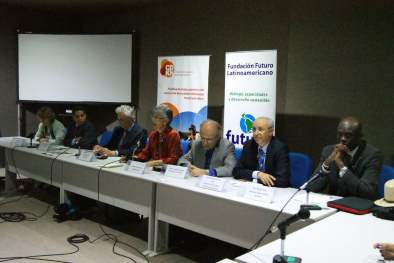The side event discussed the climate security agenda in the Amazon and worldwide, focusing on ways in which Climate Compatible Development can reduce the threats that climate change poses on water, energy, and food security, and ecosystems resilience. Dr Mohamed Ait-Kadi, GWP Technical Committee Chair, was a panelist at the side event which offered the perspective of developing countries on the topic to contribute to the debate around strategies and plans for reaching sustainable development on the priority thematic areas of the UNCSD: energy, water, and food security.
Giving the example of the food crisis in 2007/2008, with unprecedented high food prices which had political implications and created riots worldwide, and making a link to the Arab spring development, Dr Ait-Kadi explained: “Climate change is a threat multiplier and has direct impacts on water security, food security and energy security. The era of low food prices is over and the competition between multiple uses of land and water will increase”. He stressed that “water security in the context of climate change calls for broader public policy planning tools with the capacity to encourage legimate public/collective clarification of trade-offs and the assessment of the potential uses of water to facilitate development and growth.”
He concluded that “IWRM provides the lens through which the many interlinked drivers and potential consequences of economic, social, and environmental changes can be identified and coordinated actions can be formulated to achieve economic efficiency, social equity, and environmental sustainability.”
Mr Bai-Mass Taal, Executive Secretary of the African Ministers' Council on Water (AMCOW), declared that people still take water for granted and that “we need to talk about the water-food-energy nexus” saying that Africa depends on irrigation for its agriculture, and yet Africa lacks the necessary infrastructure to get the water out. AMCOW and GWP work together to facilitate processes of integrated water recourses management implementation in Africa and to put water high on the global climate change negotiations agenda.
Mr Taal mentioned that Africa is not experiencing land grabbing, but water grabbing, where water scarce countries take over water abundant areas of Africa. “We have to remove the barriers between different sectors, without water security you cannot fight poverty and support development,” Mr Taal said and listed four areas of priority for Africa: development of infrastructure, energy, water resources management, and IT.
Emphasizing that we need to change our thinking and the way we act and governments are organized, Dr Ait-Kadi said that, “New institutional arrangements need to be created that take into consideration the increasing interconnectedness of these issues. A broader set of actors around the table is needed”. GWP facilitates multi-stakeholder platforms and produces knowledge to support such dialogues. “We should act before issues become a threat to security, because when you are there, there is no way we can go back to cooperation. The gaps of global governance should also be considered among the global risks”, Dr Ait-Kadi said.
The side event was organized by Fundación Futuro Latinoamericano (FFLA) Climate and Development Knowledge Network (CDKN), a global alliance with six partners (FFLA, ODI, SSN, LEAD, INTRAC, PWC), and moderated by Ms. Yolanda Kakabadse, President of WWF global and Regional Director of CDKN. Ms Kakabadse mentioned that the UN Security Council in 2012 for the first time discussed climate change as a security issue, acknowledging that it is a pivotal issue, not only for the environmentalists. It was also pointed out that climate change does not create war in itself, but it is a multiplier and therefore it is a major threat to the world peace. The panel concluded that links for multinational cooperation among people are needed to address the issue of climate change.

